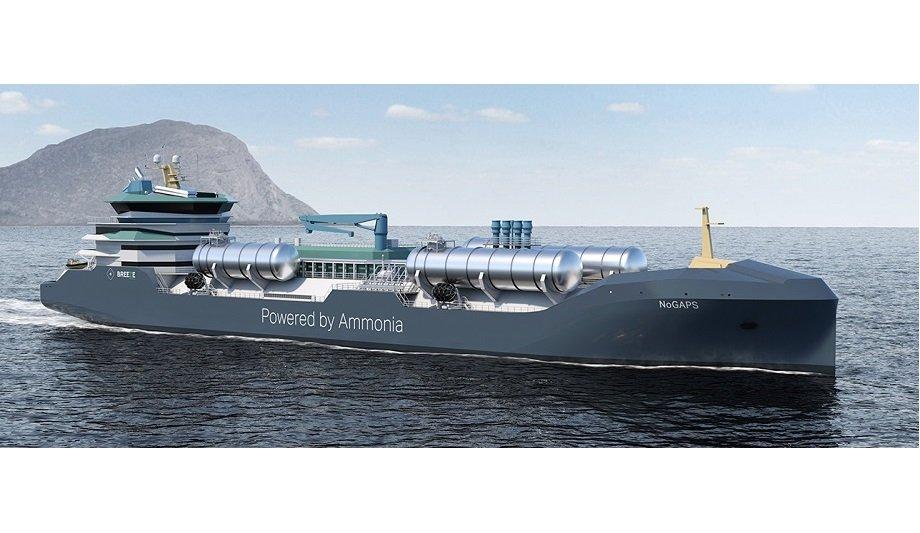Classification society - DNV has awarded the Mærsk Mc-Kinney Møller Center for Zero Carbon Shipping in collaboration with Nordic Green Ammonia Powered Ships (NoGAPS) partners - BW Epic Kosan, Yara, MAN Energy Solutions, Wärtsilä, Global Maritime Forum, and Breeze Ship Design an Approval in Principle (AiP) for the design of an ammonia-powered gas carrier – the M/S NoGAPS.
The certificates were presented during the Nor-Shipping trade fair at the DNV stand.
Multi-fuel zero carbon future
The maritime industry is accelerating in its drive toward a multi-fuel zero carbon future
The maritime industry is accelerating in its drive toward a multi-fuel zero carbon future. One of the promising options is ammonia when produced sustainably from hydrogen generated using renewable electricity.
Harnessing the potential of ammonia and overcoming the technical challenges of the fuel has brought together the partners in the Nordic Green Ammonia Powered Ships (NoGAPS) project, to have an ammonia-powered ammonia carrier in operation in the region.
Proof of concept
In the first phase of the NoGAPS project, the partners developed a proof of concept on overcoming the barriers to the adoption of the fuel, with a focus on safety and efficiency, the fuel supply chain, and overall commercial viability.
The second phase, which is still ongoing, began with the development of a vessel design, to have a vessel in operation. The long-term aim is to develop an infrastructure, operational, and business ecosystem for ammonia-powered shipping.
Ammonia
“As shipping steps up to tackle the decarbonisation challenge, regional initiatives that pioneer and demonstrate the potential of new fuels and technologies, can help lead the way to wider adoption while building local expertise and opportunities,” said Tuva Flagstad-Andersen, Regional Manager of Region North Europe, DNV.
Tuva Flagstad-Andersen adds, “Ammonia is a promising alternative fuel option – one that we have been working to enable for several years now, including developing the Gas Fuelled Ammonia notation. We are very proud to be part of NoGAPS, collaborating with an extremely strong group of stakeholders who have the experience, expertise, and cooperative spirit to deliver on this innovative concept.”
Novel design and safety
NoGAPS provides a leading example of the benefit of starting with ammonia as a fuel in the gas carrier segment"“Collaborative novel design development and safety case integration are critical for the necessary maturation of the ammonia fuel pathway,” said Claus Winter Graugaard, Chief Technology Officer of Onboard Vessel Solutions at the Mærsk Mc-Kinney Møller Center for Zero Carbon Shipping.
Claus Winter Graugaard adds, “NoGAPS provides a leading example of this and demonstrates the benefit of starting with ammonia as a fuel in the gas carrier segment.”
Steps toward decarbonisation
"BW Epic Kosan is a proud partner of NoGAPS, and we congratulate the team on achieving DNV Class Approval in Principle," said Thomas Woidemann, Commercial Director of BW Epic Kosan.
Thomas Woidemann adds, "This brings us closer to full Class certification of ammonia-powered M/V NoGAPS and demonstrates that industry collaboration can achieve a step change in pioneering technology towards decarbonising shipping. We remain a committed partner to NOGAPS and look forward to delivering further progress together."
Approaching new investments
"Yara Clean Ammonia has actively contributed to the NoGaps projects, and we are delighted to see that we have reached Approval-in-Principle for the NoGaps vessel design," says Murali Srinivasan, Senior Vice President and Head of Commercial Operations in Yara Clean Ammonia.
Murali Srinivasan adds, "We believe that the NoGaps projects will contribute to lowering the threshold for new investments in zero carbon ammonia fueled shipping."
Green ocean-going vessels
We are so pleased to have so many of the initial partners, including DNV, still involved as we reach this crucial milestone"
“When the Global Maritime Forum brought together the NoGAPS consortium in 2020, we believed that this could be one of the first ocean-going vessels to prove the concept of shipping powered by clean ammonia,” said Jesse Fahnestock, Project Director Decarbonisation, Head of Analysis at the Global Maritime Forum.
Jesse Fahnestock adds, “We are so pleased to have so many of the initial partners, including DNV, still involved as we reach this crucial milestone.”
Energy transition
“We are proud and humbled to be selected by Mærsk Mc-Kinney Møller Center for Zero Carbon Shipping and the other project partners as the ship designer for the NoGAPS project,” said Reinert Nordtveit, COO of Breeze Ship Design.
Reinert Nordtveit adds, “The project fits well with our strategy to be a leading design company accelerating the energy transition to low-carbon shipping. Working in clusters with close cooperation between leading industry partners is the strength of the maritime industry. This project, among others, shows that decarbonisation of shipping happens now and it’s our common responsibility to accelerate this development.”
Approval in Principle (AiP)
For the AiP, DNV has reviewed the design of the vessel for compliance with the DNV rules for Gas Carriers Pt.5 Ch.7 and the IGC code, with a particular focus on the arrangement and systems onboard related to the cargo and fuel installation.
An Approval in Principle (AiP) is an independent assessment of a concept within an agreed framework, confirming that the design is feasible, and no significant obstacles exist to prevent the concept from being realised.
NoGAPS
NoGAPS is made possible by Nordic Innovation Fund funding and in-kind support from consortium partners, including BW Epic Kosan, DNV, Global Maritime Forum, Mærsk Mc-Kinney Møller Center for Zero Carbon Shipping, MAN Energy Solutions, Wärtsilä, and Yara.
Danish Maritime Authority is the flag representative and Breeze Ship Design is the ship designer. NoGAPS is one of five projects awarded grants by Nordic Innovation as part of the Nordic Innovation Mobility Mission to decarbonise Nordic ports, and the transport of people and goods, on and between sea and land.
